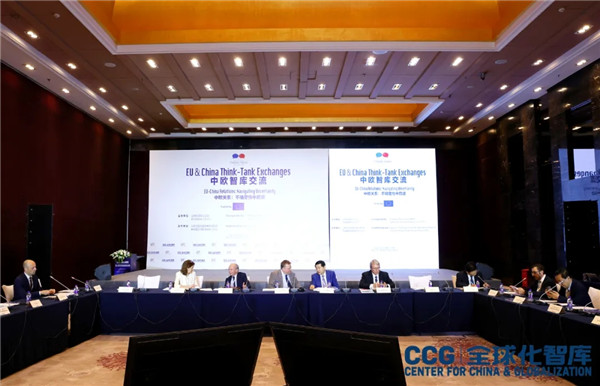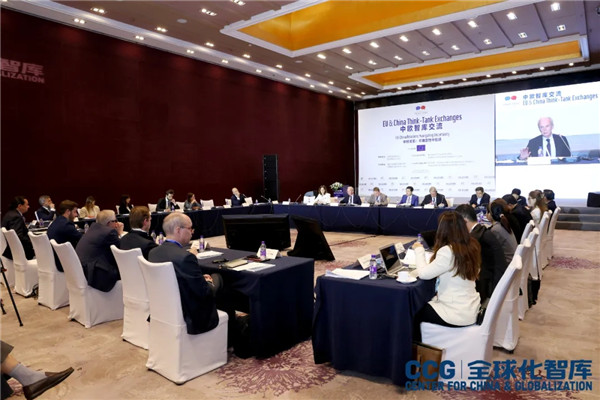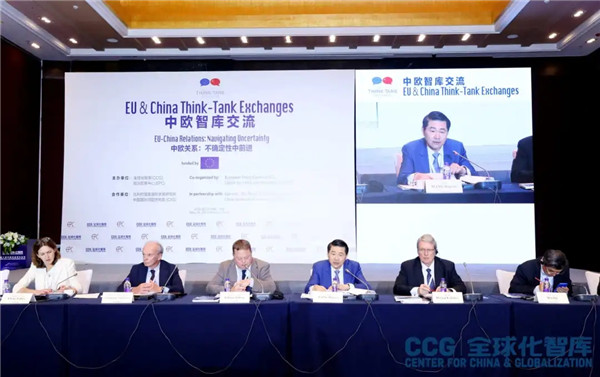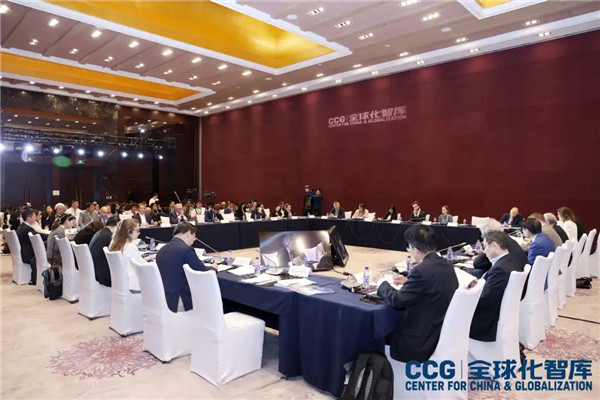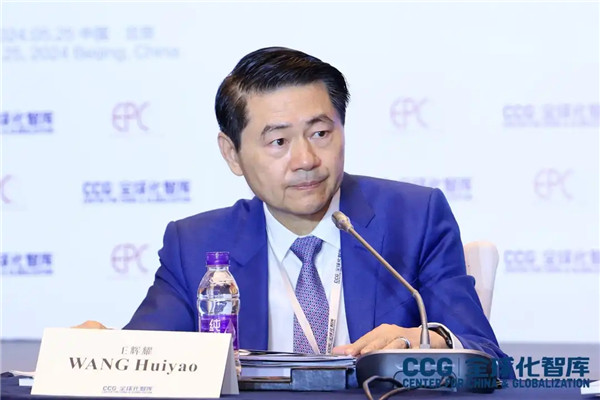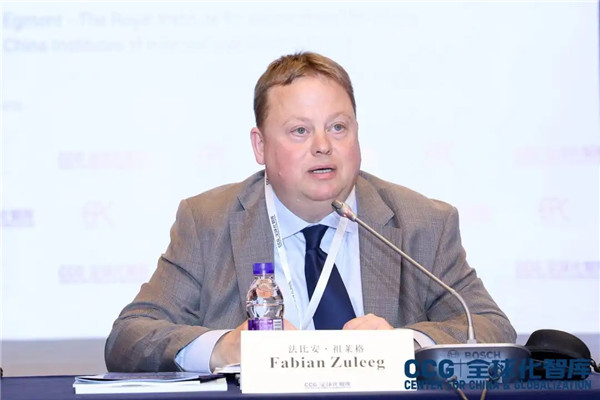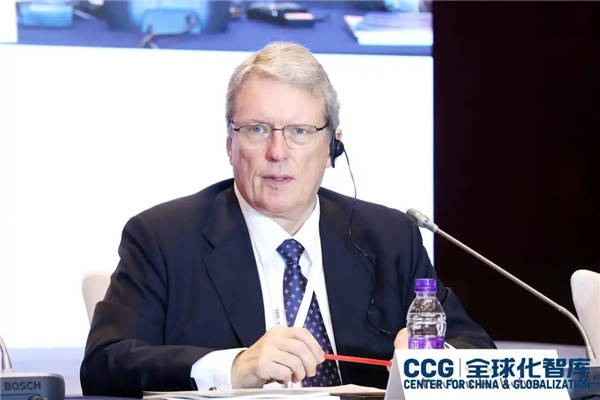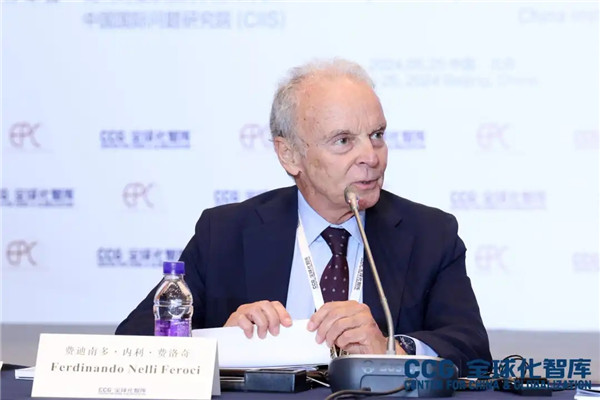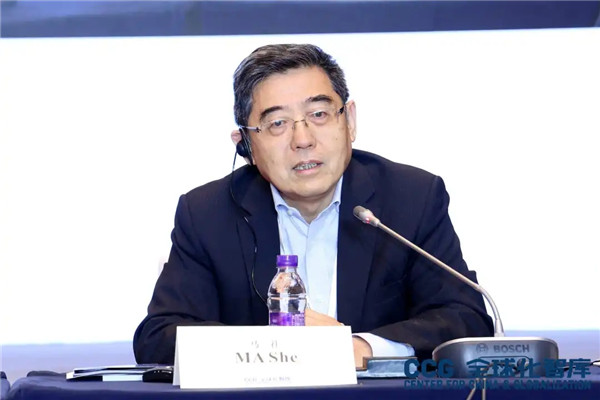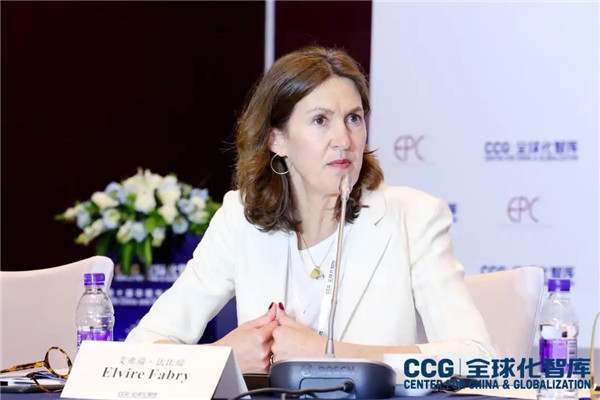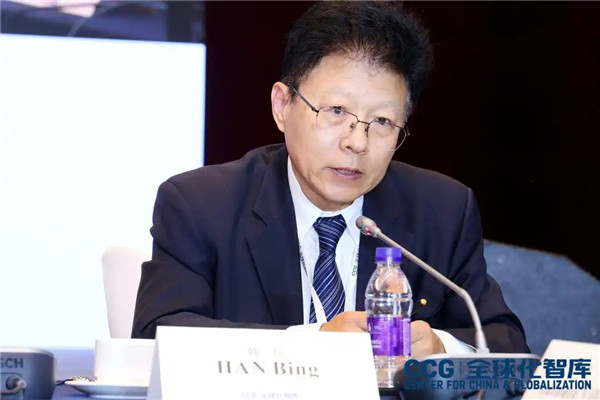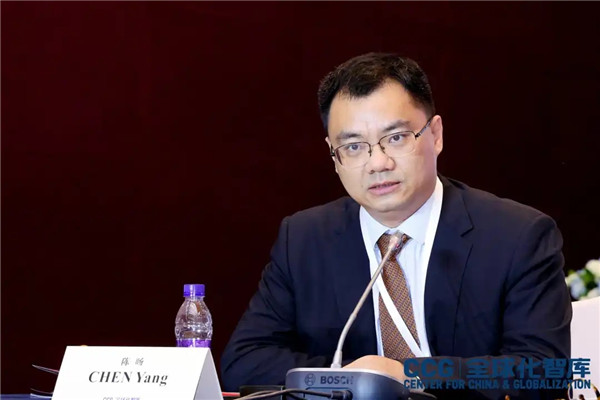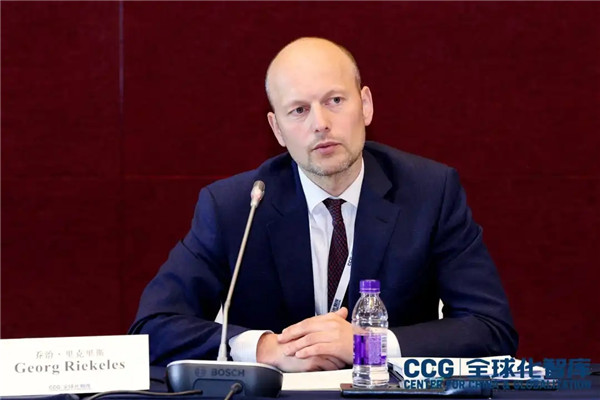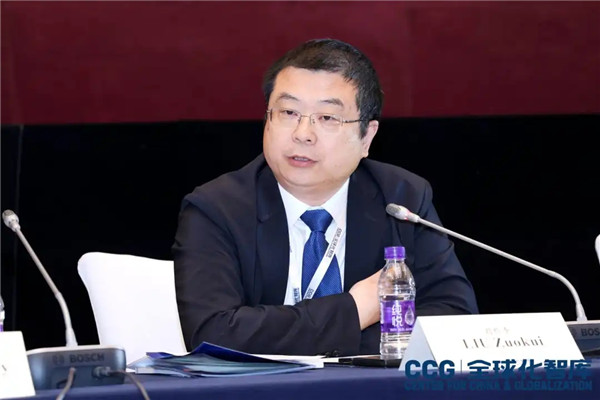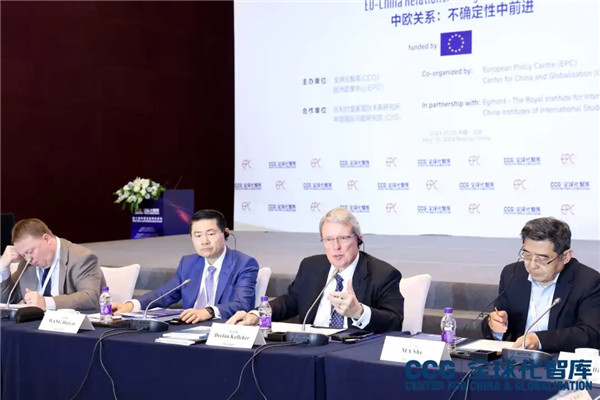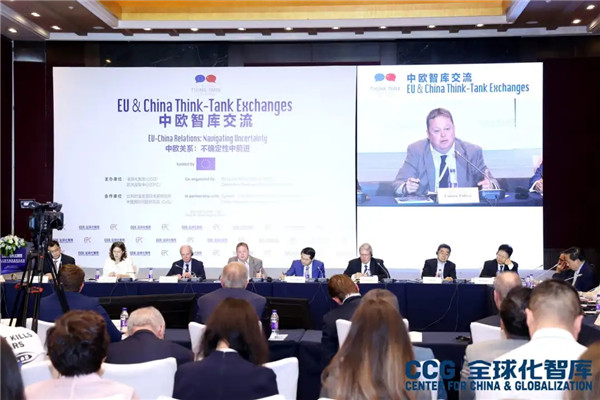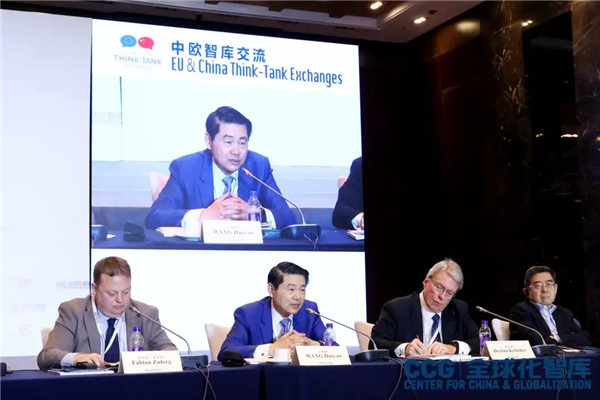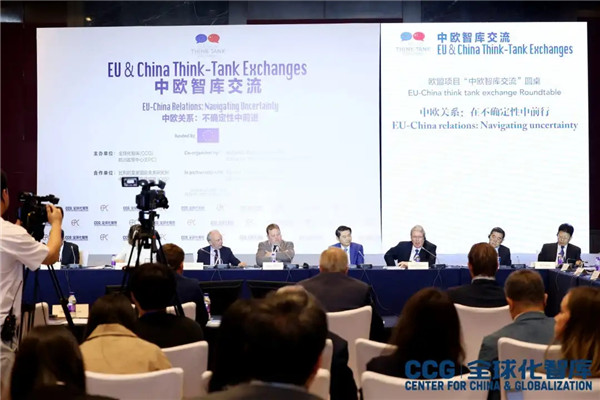Transcript of EU-China think tank exchange
June 25 , 2024
The panel was moderated by Declan Kelleher, Chair of the Governing Board, EPC; former Ambassador of Ireland to China.
The speakers are, by order of appearance:
WANG Huiyao, Founder and President, CCG; Former Counselor to China State Council
Fabian Zuleeg, Chief Executive and Economist, EPC
Ferdinando Nelli Feroci, President, IAI; former Permanent Representative of Italy to the European Union
MA She, CCG Nonresident Senior Fellow; Former Deputy Director-General of MOFCOM Department of European Affairs; Former Minister Counselor at the Chinese Embassy in France
Elvire Fabry, Senior Research Fellow, Jacques Delors Institute
HAN Bing, CCG Nonresident Senior Fellow; Former Deputy Director-General of MOFCOM Department of European Affairs; Former Economic and Commercial Counselor at the Chinese Embassy in Croatia and Poland
CHEN Yang, Executive Director, Institute of European Studies, China Institutes of Contemporary International Relations (CICIR)
Georg Riekeles, Associate Director and Head of Europe’s Political Economy, EPC
LIU Zuokui, Director, Institute of World History, Chinese Academy of Social Sciences (CASS)
Kenneth Fredriksen, Senior Vice President, Europe Region, Huawei Technologies
WANG Huiyao, Founder and President, CCG; Former Conselor to China State Council
We have been very pleased to work with EPC for the last four or five years already, and we’ve done this twice already in China. We have also been to Brussels a few times and are very pleased to have Fabian, the CEO of EPC and the best-acclaimed chairman of EPC, and all the distinguished panelists and guests. And we also have Ferndinano, the Italian Ambassador, joining us as well. I’m not going to count the names, but I’m sure you have seen them all on the list. And we also have Chinese and other European delegates. Of course, quite a few of my colleagues, are senior fellows of EPC and we have some industry representatives here too. I think it’s important that we continue this EU-China think tank dialogue. Particularly, the EU is very active in terms of international relations on multilateralism, on supporting WTO—traditionally, the EU has always played so many important roles. As the third largest economy, the EU is so important. We’re facing an election of the EU this year, now we have to work to stabilize and even improve China-EU relations and China-US relations. So it’s really important that we’re having this afternoon session to discuss all those issues. What I would like to say is that China attaches great importance to bilateral relations with the EU. And we know that President Xi has recently visited Europe and brought back many agreements and successful results of discussion. We have seen many European leaders visiting China. Olaf Scholz was here a few months ago and President Xi was in France.
China and the EU have a long tradition. We have no border issues. We have no Thucydides’s Trap issues. We just want to maintain good cooperation. But of course, there are differences. There are concerns on the economic front and on the ideological differences. But I think there’s always a way to work together. For example, China proposed the Belt and Road Initiative, and the EU proposed the EU Global Gateway. We could work together even with B3W. So, In the future, we could do something about AI. For example, China and France released a joint declaration on AI and global governance during President Xi’s state visit to France recently. These agreements underscore our commitment to address AI risk and promote secure, reliable, and trustworthy AI technology. So I think basically, we’re here to discuss and I’m very happy to just make this brief opening remark. And again, as I mentioned, CCG and EPC have been collaborating for so long, we’re very pleased to hear different voices, we provide a platform for participation, and we’d like to strengthen China-EU cooperation. Thank you.
Fabian Zuleeg, Chief Executive and Economist, EPC
Thank you very much. Firstly, a very warm welcome for me as co-host as well. I’m very happy that we have this chance to continue our EU-China think tank exchanges. In that context, I also want to thank the European Union for financing this project, and certainly a big thanks also to CCG, Henry, Mabel, and everyone else who have been great partners. We are hoping and are confident that we will continue that partnership also in the future. Let me also use this opportunity to thank the EPC team, which has worked very hard. And also thank you to all the guests who have traveled to join in this discussion. I think in a time like this, it is extremely important to have dialogue, to have an open and honest dialogue with each other, not despite the geopolitical situation, but because of the geopolitical situation at that moment in time. It is even more important to continue to talk and to continue to find solutions for some of the common global challenges that we are facing. We have to recognize that there are also challenges within that relationship, and I’m sure we will have a very good discussion of all of those aspects. Given that I also will get a chance to speak in the first panel, I will not go too much into content but thank you all very much for being here.
Declan Kelleher, Chair of the Governing Board, EPC; Former Ambassador of Ireland to China and the European Union
Thank you, Henry. Thanks, Fabian. So I think we now start the roundtable. Just in terms of procedures and working methods, what I propose is that we alternate between Chinese speakers and European speakers to ensure variety and rhythm. Also, I would invite, towards the end of the discussion, Henry and Fabian to come in again with comments. And of course, they should feel free at any time. So as we’ve started, we’ve gone Henry and Fabian. So I think we go back to a Chinese speaker now. So could I invite Yang Chen, Executive Director of the Institute of European Studies at the China Institute of Contemporary International Relations (CICIR)? I’d seek him to take the floor, please. Thank you. Where is Chen Yang? Okay. Then in that case, could I then slightly deviate from the procedure I just said and invite my distinguished friend and colleague, Ambassador Ferdinando Nelli Ferosi, to take the floor? Please. Thank you, Ferdinando.
Ferdinando Nelli Ferosi, President, IAI; Former Permanent Representative of Italy to the European Union
Thank you. Many thanks to CCG and EPC for organizing jointly this session, which I think is very useful and, I hope, is going to be very useful in time.
I’m sure that all of you are aware that back in 2019, the European Union described China, the most famous triptych, being at the same time as an important partner for dealing with major global issues, as an economic competitor, and also as a systemic rival.
A “partner” because China was already then recognized as an absolutely important partner in dealing with global challenges like climate change, the energy transition, the protection of the environment, food security, and global health.
An “economic competitor” is a recognition that the strength of the Chinese economy and their incredible development in technology had become a challenge for Europe. And also because to a certain extent, we in Europe consider that China is not 100% compliant with commitments that China undertook when becoming a member of WTO.
And finally, “systemic rival,” because unfortunately, we have to recognize this is a very open and frank session. I think we have to speak openly. We differ on very important things when it comes to certain values and principles, on certain issues that are related to domestic Chinese governance, but also on certain aspects of China’s posture on international affairs. I don’t want to deal with this in detail, but these are things that are very well-known to all of you.
Now, my point of departure is that that description, which was adopted more or less formally by the European Union back in 2019, is still valid in its essence. But unfortunately, the situation has become even more complex and complicated than used to be five years ago—for a number of reasons. The first one is COVID. COVID, in particular the economic impact of COVID on our economies, particularly European economies, has made us aware of the consequences of economic fragmentation, the weaknesses of global value chains, and the risks related to excessive dependencies and economic vulnerabilities. This, in particular, made us aware of the risk of excessive dependence on China. I would say a word of this in a moment.
The second element, which has made our relations more complicated than they used to be in 2019 is the war in Ukraine. And I have to be once more very frank and honest, we were rather disappointed by the role played by China so far in that respect. We would have expected a much clearer stance on condemning Russia’s aggression against Ukraine. We would have expected more solidarity in our efforts to isolate Russia and a more proactive role in the search for a peaceful and political solution. We are all aware that China presented a peace plan, which was very interesting.
But again, to be frank and honest, we had the impression that China was not ready to fully implement and exert the necessary pressure on the Russian side in order to make their plan operational. And one more element, which has complicated the situation when it comes to relations between the European Union and China is once more the result of both COVID and the war in Ukraine, and the need for the European Union to adopt and implement a strategy, which is meant to increase and improve our economic competitiveness and to improve our economic security. So for these three factors, in part, also for our own choices, I have to realize—maybe you will not share this view—that situation is becoming more complicated than used to be in 2019.
I would not discuss it in my presentation now because that would bring me too far. Differences of views when it comes to international relations or fundamental values and principles are very well known, and fortunately, to a certain extent that still can be manageable with some degree of goodwill, which I think is necessary on both sides. And I will mainly concentrate on the differences in the economic field.
To explain why and to what extent these differences are there, I would focus and concentrate on the choice we made in Europe to make the improvement of our competitors a strategic goal of the European Union today and for the foreseeable future.
And this is, again, one of the consequences of COVID and the war in Ukraine, as I said, because, we realized that our economy was excessively dependent on the external for many, many important supplies. We realized that we needed to become more autonomous. This brings us to the notion of strategic autonomy, which is another important element of our strategy. This brought us to adopt a number of measures that were meant to reduce our dependencies and also to improve and increase our economic security. To be very honest and frank, we never thought in Europe that decoupling would have been a feasible strategy when it comes to China. We decided to decouple with Russia for very evident reasons. Whether we succeeded or not, it’s another story. But the decision was there and was a response to Russia’s aggression against Ukraine. China is a totally different story. We do not consider decoupling as a feasible strategy. We consider that we have to work on something that is more, much more, in a sense, reasonable, not easy to implement, which is called derisking.
Now, derisking is a keyword that describes many different things. It has to be noted also that this is part of our strategy to realize technological autonomy. Derisking can be implemented through a series of different measures. Some of them are defensive in their nature, like measures that we have taken to scrutinize foreign investment or also outbound investment, measures that we are using or threaten to use against unfair trade practices by third countries, or measures that we are at our disposal as anti-coercion measures adopted by third countries and so on and so forth.
Other measures are defined—I don’t know whether this is the correct definition—as more offensive in the sense that they are meant to increase our own autonomy and improve our competitiveness. Look at the measures that we have adopted and are trying to implement to become more autonomous on raw materials, chips, and our semiconductors, and other things.
But then I would like to stage one point, which in my view is absolutely important. This strategy is not meant to be interpreted as anti-Chinese. It is a strategy that has a general value and a global application. If it has a direct impact on EU-China relations, it’s only for a reason. That is because China’s economy is too important and too big, and the two economies of China and Europe are so interdependent and, avoidably, China becomes a target of this measure, or risks becoming a target of these measures. So there is nothing particularly aggressive on our side against China. We in Europe want to continue to have dialogue with China. We want to continue to have a collaborative attitude with this country, which the EU considers an essential partner in international affairs.
And I think I may conclude with some pure recommendations. They’re very evident, but I think they need to be repeated on all possible occasions. We have to continue and intensify dialogue among Europeans and Chinese, possibly dialogue conducted by common institutions. We Europeans have to avoid rushing to China to diversify our positions in order to present ourselves as best friends of China. We have to avoid any risks of escalating tensions, which is true for both sides. I think, to a certain extent, we also have to avoid—this is very important—interference in domestic affairs because interferences of this sort would bring us nowhere. And it is very important that you have to avoid a spiral of protectionist measures that are there and there are risks created from both sides.
Finally, I would make two final recommendations, which are aimed both at the EU side and the Chinese side. For the EU—I speak very freely because I know this is an open discussion. I’m not an official, so I can speak—the first recommendation would be to avoid the free-riding risks of countries that sometimes try to present themselves on their own side with China and try to stick as much as possible to a common position because that would make it easier for us to defend our common positions with Chinese interlocutors. And for China, to avoid the temptation of playing the Europeans against each other, because they wouldn’t bring us too far away into distance. Thank you very much for your attention.
Declan Kelleher, Chair of the Governing Board, EPC; Former Ambassador of Ireland to China and the European Union
Thank you, Ferdinando. And I would just say generally, and Ferdinando, very much, I was in line with that we’d aim for each speaker to speak for about six minutes maximum. So there’ll be time for some discussion at the end. Next, it’s my pleasure to invite my old friend, Ma She, who is former Deputy Director-General of MOFCOM Department of European Affairs, former Minister Counselor at the Chinese Embassy in France, and Nonresident Senior Fellow in CCG, to take the floor, please. Thank you.
Ma She, CCG Nonresident Senior Fellow; Former Deputy Director-General of MOFCOM Department of European Affairs; Former Minister Counselor at the Chinese Embassy in France
Thank you, ambassador. So I speak Chinese. My English is not sufficient.
[Speaking through translation]
It is my great pleasure to join this symposium on China-EU relations organized by CCG. It’s a great opportunity for me to meet many European friends and discuss our bilateral relationship.
I was the Deputy Director-General of the Department of European Affairs at the Ministry of Commerce (MOFCOM). Throughout my career at MOFCOM until my retirement, I was responsible for European affairs, including eight years working at the Chinese Embassy in France. Therefore, I can say that my career has witnessed the deepening of China-Europe relations.
When I joined the Ministry of Commerce, the relationship between China and the European Union, which at the time was called the European Community, was at a very preliminary stage. China and the EU established diplomatic ties in 1979. In 1978, our bilateral trade volume was only 3.284 billion USD, but it reached 780 billion USD last year. EU-China relations have undergone extraordinary changes in every area: economy, politics, society, culture, especially trade and investment. I am very pleased to witness such great progress, to which I have dedicated much work. I have been to Brussels over 40 times, either for meetings or negotiations, because there are many mechanisms for China-EU economic exchanges. I still take pride in my contributions to our bilateral economic and trade relations.
However, I regret that the China-EU relationship has hit a trough in recent years. For example, the EU-China Comprehensive Agreement on Investment (CAI), an achievement with so much time and effort in negotiations, has been left stranded. Additionally, many China-EU communication mechanisms, such as the High-Level Economic and Trade Dialogue (HED) have been mothballed. China-EU exchanges have been limited, leading to many emerging issues, especially those related to trade and investment. The EU now recognizes China as a partner for cooperation, an economic competitor, and a systemic rival. All this suggests that our bilateral relationship has fundamentally changed. As a think tank, we must reflect on why China-EU relations have deteriorated. As the saying goes, it takes two to tango. This is not the responsibility of any single party; both sides must be accountable. As Chinese people always say, we need more introspection.
From my perspective, several factors have influenced the China-EU relationship. First, the three years of COVID have blocked people-to-people exchanges. During these years, there were face-to-face communications, which heavily impeded people’s mutual understanding and interactions. These implications cannot be ignored. Although online meetings are always available in today’s internet era, they cannot replace face-to-face communications. During this period, our heads of state, members of parliament, officials, reporters, and people had no interaction, leading to estrangement and misunderstanding.
Other international factors, including, as the previous speaker mentioned, the Russia-Ukraine war, changes in the economic landscape, and China-U.S. relations, have all influenced the China-EU relationship.
Third, mutual research between think tanks in China and Europe is insufficient. China’s research into the EU is lacking in terms of personnel and organizations, lagging far behind research into China-US relations, China-Japan relations, and even China-South Korea relations. From the EU’s perspective, research on China is often, if I may, bureaucratic and not in-depth. This can mislead decision-makers as research reports tend to be superficial. Therefore, think tanks in China and the EU must address this insufficiency in mutual study.
Chinese people have a very favorable impression of Europeans, as there are no significant geopolitical conflicts between the two regions to create mental barriers. And Chinese people love European culture. Europe is one of the most favored destinations for Chinese tourists, indicating their deep affection for Europe.
However, promoting China-EU relations and steering them towards a more friendly and accelerated path requires more effort on various fronts. As a think tank, we should provide more objective and actionable suggestions. It is imperative for us to figure out the essence, features, development potential, and advantages of China-EU relations. In general, much remains to be done to improve bilateral ties.
Today’s session hosted by CCG is a good opportunity. It is also a good opportunity for me to meet my old friend, the Ambassador of Ireland, again. I have met him multiple times when I was in MOFCOM. I’ve been to Ireland several times. Ireland has been very friendly to China and has left us with a very positive impression. I will stop here. Thank you.
Declan Kelleher, Chair of the Governing Board, EPC; Former Ambassador of Ireland to China and the European Union
Well, thank you very much, Director-General Ma. Thank you for those kind words too. You emphasize some very important points: the need for people-to-people relations, and the need for study to be accurate. You raised the question of how to move forward and how best to ensure and actualize the potential of the EU-China relationship. So I think, like the previous speaker, Ambassador Nelli Ferosi, there’s some very rich basis on which we go forward. And in that vein, can I invite Elvire Fabry, Senior Research Fellow of the Jacques Delors Institute to take the floor, please?
Elvire Fabry, Senior Research Fellow, Jacques Delors Institute
Thank you very much. And I would like to thank CCG and EPC for organizing this discussion and for inviting me. We mentioned the visit of President Xi to Europe recently. It was a very expected visit and it was very welcome because we, I think we can all agree that the EU and China have endorsed much more defensive postures recently and that we have been moving from a phase of multiple announcements of potential defensive measures to a phase of implementation of these measures, with the risk of obvious escalation for that in retaliation. And I think that this discussion is precisely allowing for frank discussion and trying to dig into what can be our misunderstanding, particularly on two misunderstandings. I would like to focus on the concern that China has with what we target as Chinese overcapacities, the pressure that it is imposing on the EU and elsewhere, and the rising protectionism on the European side.
Chinese overcapacity is obviously related to the competitive advantage that China has gained in the technological sector, notably in the green technological sector. It’s due to its economic model based on three pillars: setting strategic objectives, important state aid, and very fierce domestic competition among Chinese companies. This model has proved to be very successful. Now what is worrying the EU is the shift of investment from the real estate sector to the manufacturing sector. While the manufacturing sector in China is already very important and represents a big share of Chinese growth, the focus now on exports, notably of green technologies, which is essential leverage for Chinese economic growth, is increasing the imbalances between the importance of domestic demand and the importance of the manufacturing demand, and imposing a lot of pressure on competitors in the European market and elsewhere.
That’s what is getting me to how we understand protectionism on the European side. The Europeans do not intend to decouple, as was mentioned by the ambassador previously; the focus of the Europeans is really on the resilience of supply chains and maintaining global supply chains open. We have the same concern as China; it’s to support our growth. The priorities of the European Commission are to use the new tools of trade, and autonomous defense, to protect the European industry but avoid protectionism, precisely, remaining in line with WTO rules. This is an objective that is very strongly rooted in the European Commission.
Now we need to pay attention to the trends that will be expressed during the European elections with increasing populist movements calling for concrete protectionism. So there’s really a strong potential in Europe to choose more protectionist avenues. But this is not, for the moment, the choice of the European Commission. The expectation on the European side would be rather to try to rebalance the importance of Chinese demand with investment in the manufacturing sector and to address the risk of further imbalances at the global level.
That takes me just to a word on WTO because we’ve been focusing a lot on the United Nations this morning and mentioning less the WTO. We need to be aware that if we are not confident in the capacity to negotiate strongly at the WTO level, there’s a further risk of erosion of respect for WTO rules, and we need to go back to the spirit of the WTO, which is to preserve the balance of the global economy. Measures that would support the Chinese demand, the Chinese consumption, and more reciprocity in access to Chinese consumption would be much more expected on the European side. Thank you.
Declan Kelleher, Chair of the Governing Board, EPC; Former Ambassador of Ireland to China and the European Union
Thank you, Elvire. You raised an interesting point: the link between what’s described as Chinese overcapacity and the deficiency of domestic demand within China, and a high savings rate. I wonder in the discussion at any stage, if any of the Chinese interlocutors may like to comment on that, but we’ll proceed with the speakers’ list straight away. So could I invite Han Bing, who is the former deputy director general of MOFCOM, Department of European Affairs, former Economic and Commercial Counselor at the Chinese Embassy in Croatia and in Poland, and who is now a non-resident senior fellow at CCG, to take the floor? Thank you.
Han Bing, Former Deputy Director-General of MOFCOM Department of European Affairs; Former Economic and Commercial Counselor at the Chinese Embassy in Croatia and Poland; CCG Nonresident Senior Fellow
Thank you. I would like to thank CCG for inviting me to attend today’s roundtable. It’s a good opportunity to exchange views with the guests. I spent about 15 years in Europe and worked with mainly Eastern European countries. Over the last 10 years, I was in Africa. I’m suggested to speak in English, but I’m afraid that my English is poor. I cannot precisely express my thinking. So I would like to speak in Chinese. Thank you for your understanding.
[Speaking through translation]
I believe that recent developments in China-EU relations have been less than ideal, and several major issues need addressing. The first is mutual trust. During a recent conversation with Martin Wolf, chief economics commentator at the Financial Times, he emphasized that strengthening mutual trust is crucial. This trust is built on mutual understanding and communication. The three-year pandemic has indeed created significant challenges, but since China’s reopening, considerable efforts have been made, including extending visa-free travel to many European countries to facilitate bilateral exchanges. Strengthening mutual exchanges is essential, and it should be done with goodwill on both sides.
Regarding Europe’s triptych towards China—first as a partner, then as a competitor, and finally as a systemic rival—I believe we should prioritize partnership. China focuses primarily on cooperation with the EU and does not view the EU as an adversary. China hopes to engage in extensive cooperation with the EU, including initiatives like Global Gateway in terms of infrastructure development. I see these as opportunities for trilateral cooperation. Having spent ten years in Africa, I understand the significant demand for infrastructure development there. In this respect, China’s Belt and Road Initiative and Europe’s Global Gateway can be complementary and collaborative. This cooperation must be based on mutual goodwill.
Additionally, in bilateral relations, it is essential to adopt a rational mindset and avoid impulsive actions. Some politicians tend to be quite impulsive, and officials and politicians at various levels are not particularly calm in their deliberations. In this complex and sometimes adversarial world, a true politician does not aim to give only one side the advantages, as doing so will upset the other side. Instead, a true politician should propose solutions acceptable to both parties, rather than making one side happy at the expense of the other.
On economic issues, it is essential to adhere to economic principles. China and the EU can cooperate effectively within the framework of the WTO. The pan-politicization or pan-securitization of economic issues may be harmful to both sides. When China initially opened its market, it was largely dominated by European, American, and Japanese technologies, which earned substantial excess profits. China now aims not to be taken advantage of but to leverage its own technologies. As China’s technologies reach leading positions, they open up new avenues for cooperation. When Western technologies monopolized the Chinese market, China learned from them by engaging in joint ventures and technical collaborations. Similarly, if Europe feels threatened by Chinese technologies now, the problem can be solved by introducing Chinese technologies in Europe and working together to address these concerns. Security issues, I believe, are not insurmountable and can be resolved through technological cooperation. We must adopt a cooperative mentality to address these issues, and I believe they can be resolved. Thank you.
Declan Kelleher, Chair of the Governing Board, EPC; Former Ambassador of Ireland to China and the European Union
Thank you very much. Director-General Han. You rightly said we must have the mentality of cooperation. So again, moving forward in that positive vein, could I now invite Chen Yang, who’s the executive director of the Institute of European Studies at the CICIR, to take the floor? Please.
Chen Yang, Executive Director of the Institute of European Studies, China Institutes of Contemporary International Relations (CICIR)
Thank you, Chair. Thank you, CCG, for having me. First, I have to say that I’m sorry for being late. I was caught in a big traffic jam, so I had time to carefully observe the cars on the street. I couldn’t help but notice how many cars were from China, Germany, and Japan. My conclusion is that most of them are from Germany and Japan. But in China, we don’t talk about the overcapacity of German or Japanese cars. Instead, we see Germany and Japan as trade partners. We accept their advanced cars in our market. That’s my first point. Let me turn to our topic this afternoon. I received the program. The topic is about bilateral relations in the area of economic security.
First of all, I want to say recently, that I have read a paper from Bruegel, “How to de-risk: European economic security in a world of interdependence.” This paper is new, but not the first one I have read. I have read many such papers; they try to find a way how to derisk China. Right now, it’s a hot topic in Europe. I want to spend some time analyzing this paper.
The paper raised two questions. First, how the EU should derisk its external economic relationship without foregoing the benefit of trade? Second, how can policymakers tell when trade dependence is excessive? To settle these problems, the paper put forth some proposals. First, de-risking should focus on a few product categories for which the costs of supply interruptions would be unquestionably large. Second, build up a deeper and broader European single market to raise resilience. Third, complete derisking and resilience with deterrence.
However, in my opinion, these proposals didn’t provide convincing answers, but just raised much more questions. How does one measure the “unquestionably large costs of supply interruptions”? How deeper and broader should the European single market become to get resilience and address the concerns of EU member states, ensuring that deterrence could not trigger retaliation from trade partners, particularly if these measures violate WTO rules? It seems that the author of the paper just uses some descriptive names to answer these two questions.
Actually, the answer is impossible because the dependence cannot be identified as reliable even with sophisticated analysis and data. For example, as the EU Commission defines, 137 products should be considered highly dependent on imports from third countries. But according to some European scholars’ estimates, the list could be reduced to only 21 products. That’s a huge difference just because they use different measures and different data analyses. So it’s an impossible mission to identify what products to derisk exactly.
And then the question is why we will do such hard work to get suspect results. So many researchers in Europe did such research to find how to derisk. It’s not just about getting financial support from the government or some interest groups. They do reflect concern about economic security in today’s world. In my observation, there are three reasons for this concern. First, the pandemic-related supply disruption. Second, the energy crisis provoked by the Russia-Ukraine conflict. Third, the so-called coercive actions taken by China towards Australia and Lithuania. For the first one, it should be categorized as a natural disaster. We human beings do not want to see the virus spreading happen again. With the climate change and the global warming, maybe the natural disaster will become more frequent. However, as human beings, we will get more skills and lessons through experience to face disaster.
For the second one, in many Western experts’ eyes, it should be categorized as geopolitical competition. So it’s not only about Russia, Ukraine, and Europe but also about the U.S. and China. Despite the Chinese scholars and experts keeping saying that China is not Russia, China-EU trade is very comprehensive and both sides cannot sustain economic decoupling. The Europeans do not believe it. Moreover, there are some research papers in Europe that said that (although) the trade decoupling between China and Germany may cause a shock in the short time, but in the long-term perspective, the damage to the German economy is limited. I don’t want to debate this argument here, but I want to say the risk of geopolitical competition towards the economy should not be ignored because we are living in an area of great-power competition. If some misjudgments come up, the damage will be so huge that we cannot calculate it in statistics. Even if you have goodwill to coexist with other powers, you cannot afford the price: the assumption that others think like you.
The third one. I think we talk too much about China, we almost forget when the EU issued the Anti-Coercion Act, its major target was the USA. The Trump administration threatened to launch a tariff war with the EU. We should notice that this year, Trump has a big chance to come back. That will become a big problem. But instead of coercive action, maybe we should call it economic influence. It’s a great power (countries’) tool. EU countries also use it frequently towards some developing countries to keep them in check the EU design. I think it’s a soft power. It’s better than using hard military weight. We should know that if there are great powers in the world, we cannot stop them from using them. We are living in a world with more frequent natural disasters and more fierce great power competition. Maybe there’s a huge economic crisis waiting for us not far away. Economic security concerns are rising. However, the real problem is how to deal with these concerns, especially for the bilateral relations between China and the EU.
The subject of the roundtable is the bilateral relations in an area of economic security. But I think, economic security has become a problem mostly because our bilateral relationship has become a problem. You have a picture of an enemy in your mind and define each other as a rival at first. Then there will be economic security problems. If we had good relations, economic security would not be an issue. If we have some risks, we can take control of these together. We can do de-risking together. If the EU and China produce enough green tech products together, we could have a chance to save our earth. If we communicate and cooperate more deeply, we could have a chance to avoid conflict escalation and the spillover (effect) and keep the great powers in balance, connecting and stopping the world from splitting and setting an example of how to cooperate between two different civilizations. However, right now we are lacking in basic trust, just like the previous speaker said, between the countries. We don’t have enough space for cooperation. So sincerely, I hope that you and China could shape a good bilateral relationship so as to consolidate and promote economic security and benefit other countries. That’s all. Thank you.
Declan Kelleher, Chair of the Governing Board, EPC; Former Ambassador of Ireland to China and the European Union
Thank you, Director Chen, you’ve given us much food for thought. And can I just comment that you’re, of course, correct that the Anti-Coercion Instrument was conceived initially in response to measures taken by the Trump administration against the European Union, which people sometimes forget. But that also emphasizes another important point that EU trade policy and EU measures are country-agnostic. They follow the rules, they follow WTO principles, and they are by definition country-agnostic. So thank you for your remarks. Could I invite Georg Riekeles, Associate Director and Head of Europe’s Political Economy at the European Policy Center to take the floor? Please.
Georg Riekeles, Associate Director and Head of Europe’s Political Economy, EPC
Thank you, Declan. Ladies and gentlemen, my first words, of course, will be to thank the CCG and thank Henry for the very warm welcome. I was in China for the first time 15 years ago, and that made a great impression on me. And I’m absolutely very pleased to be here again.
I wanted, given that a lot has been said already, to make a link to this morning’s discussion. And of course, Europe, the EU, we as Europeans are very attached to global governance, the fight against climate change, the fight for biodiversity, global health, food security, and also new challenges—AI, space, as it was also mentioned this morning. But in this context, I want to make one comment, and that is that: don’t make the mistake, I think, of believing that Europe’s attachment to global governance will prevent the EU from defending its interests and its most fundamental values. One can be attached to global governance, but one also has to look after one’s interests and most fundamental values.
And in this regard, I wanted to reflect a little bit on something else that was said this morning to start with. And the analysis that was put forward by our friend from Serbia, who suggested that what is happening in Europe right now is about Russia standing up to American power. And I must say that seen from Brussels, seen from the EU’s capital, that is not the problem that Europe is facing. The problem that Europe is facing is Russia’s onslaught on Ukraine. And there is no other word for it than that. Russia’s onslaught on Ukraine. It’s against the fundamental principles of the UN Charter, the principle of territorial integrity, and the right of self-determination. And it is really an existential crisis as Declan was saying this morning, an existential question, an existential threat to Europe, to European countries, to the EU, if that’s the idea that a bigger power can come in and seize territory and threaten the population of another smaller country. There’s war in Europe; there’s war on Europe. And that is conditioning Europe’s mindset right now.
And I think Ambassador Nelli Feroci has alluded to it or said it clearly twice now. This is of course also an issue in the EU-China relationship, perhaps the biggest issue in the EU-China relationship. To pick up on Mr. Ma’s words. You were asking for self-reflection both on the European side and the Chinese side and asking why it’s gone this far. Well, there is a third actor that has inserted itself between China and the EU. That is Russia.
And I heard Mr Amersi this morning. I understand he is a patron of this conference. I haven’t heard the term before – CRINKS (China, Russia, Iran & North Korea). I think this is a geopolitical picture that Europeans are profoundly uncomfortable with. And this is part of what will very much condition relations going forward. So, I think this is a backdrop that we can’t ignore when we talk about the economy.
Now to the economy, we also heard this morning that the economy and security need not couple, and they can be decoupled. I’m afraid that’s not my observation. I think the Mighty Two, China and the U.S., not Europe, not the Global South, but China and the U.S. are very much coupling the two these days. The economy is becoming security. In broader and broader fields of technology, our dual-use industrial policy is creating geopolitical facts.
Of course, now we’re talking about EU-China relations. I think what we’re observing from Europe is that China has been doing a lot of industrial policy over the past years, over the past decades. In fact, so much that Europe is starting, can I say, to take inspiration from China, “Made in China 2025,” “dual circulation.” This is something I would say that’s taken us years for Europeans to study and really to understand and come to terms with the ambitions of and the consequences of. And I think it’s more properly understood now. So I would say that Europe, for instance, is developing its own Net-Zero Industry Act (NZIA)—its investment in critical clean tech and climate tech, in wind, solar, batteries, the implications these will all have for EVs, and so on, so forth. In fact, what we are starting to do in Europe is try to do things that China decided to do already 10 or 15 years ago.
And I agree very much with what Mr Chen Sheng was saying about the EU’s economic tools. I think, you know, the attachment of the EU to open markets. I, too, spent some time counting cars outside your hotel during the two or three days I’ve been here. I must admit I didn’t see quite as many German cars as you seem to have seen. But there are many sectors we can look at. Look at the sectors of wind turbines. We had excellent producers in Europe. China is an open market as an export market, but we have encountered the greatest difficulties. So the question now is, now that we are scaling up wind power in formidable ways in Europe, whether Chinese producers should have more favorable treatment coming to Europe than what European producers had come to China.
And when it comes to EVs, as this is front and center of the discussion, for the time being, it’s an investigation by the European Commission to check whether open market principles are being respected. I think this investigation will conclude relatively quickly, and we’ll see what the decision will be. But I want to say something else: I’m not sure actually in this phase, the most significant element going forward will be tariffs.
We had another interesting comment this morning from Mr. Xu Zhengzhong about the digital civilization taking over from the industrial civilization. I heard a statement made in that context about how we didn’t want to see the digital world divided. But I may say the digital world is already divided. When I come here to China, I can’t use the applications I most commonly use in Europe. That digital world is already divided.
So even when we think about cars, when we think about EVs and autonomous driving vehicles, what are they? They are boxes of steel and aluminum and plastic, but they’re digital boxes of steel and aluminum and plastic. So I am concerned about what this digital divide will then also mean for open markets. And I think this is very much part of the challenges that we are not addressing and talking about. I don’t think that if we’re talking about open markets and open trade, it will be mostly on the tariff front. It will be very much on the regulatory front that will be facing deep challenges going forward as, by the way, we’ve already seen them in many areas.
My final word is again, turning back, to the geopolitical. I think it’s very important to understand to all our international interlocutors, the EU is a peace project. And one way to understand the EU is the EU was created after WWII as a break from WWII, with two world wars, with fascism, and I would say as a break with imperialism and colonialism. And as Deckland said this morning, a lot of the most fundamental principles of the UN corporation have been built into our Constitution; the idea of open markets has been built into The EU Constitution and The EU Treaties. The EU is not hegemonic.
So I want to say that to answer this question of how one can work further together, I think if we can avoid hegemonic tendencies, there is the possibility, and that’s what we need to do to restore historic friendship with the Chinese people. Thank you.
Declan Kelleher, Chair of the Governing Board, EPC; Former Ambassador of Ireland to China and the European Union
Thank you, Georg. Again, very much food for thought there. One point you mentioned is the shifts in the approach of philosophy among the three big players, the EU, the U.S., and China. A Finnish professor based in New York, whom I know, has written several very good books: the one on digital empires is the most recent book. In it, she classifies three different approaches, just a couple of years ago, to regulation—the U.S. approach is what she calls market-based, the EU approaches what she calls rights-based, and the Chinese approach is what she calls state-based. But you can see that the U.S. approach is now quite heavily state-based. If you look at the effects of the Inflation Reduction Act and the industrial policy the U.S. has faced, geopolitics is posing challenges for the EU and China as well. But thank you, Georg. And now could I invite Liu Zuokui, Director, Institute of World History, the Chinese Academy of Social Sciences (CASS), to take the floor?
Liu Zuokui, Director, Institute of World History, Chinese Academy of Social Sciences (CASS)
Thank you, Ambassador Declan. Also, I thank CCG very much for the invitation, especially President Wang Huiyang for your invitation. I’m also so glad to meet my friends again on April 26, Fabian, and Lin Goethals at Tsinghua University. Today, it’s a good occasion that we talk about navigating uncertainties. China-EU relations are a very good topic to discuss. I only want to say that I just changed my job just one month ago. I’ve been devoted to China-EU relations for more than 20 years, starting from the honeymoon relations between China and the EU and now ending up with more confrontational relations between China and the EU.
So I think I must go back to history to talk about the honeymoon, which will make me more pleasant. If you make a summary of China-EU relations in the past 50 years, I can see that interdependence and cooperation are always the mainstream. I totally agree with our Chinese colleague, Han Bing, that we only consider cooperation as a good choice for China-EU relations. In the past 50 years, interdependence and cooperation have been mainstream and have created enormous certainties in the world. So you see that history has proved only interdependence and cooperation are good choices.
But now we have stepped into a more uncertain world, especially since the 2008 Financial Crisis, Brexit, the COVID pandemic, and also the Ukraine crisis and Israel-Pakistan conflict. All these uncertainties have divided China-EU relations. We have some in common but more differences with each other on all these uncertainties.
When it comes to addressing the differences, China’s logic is that we can leave the differences aside and enhance cooperation in some areas that we have in common. But I have an impression that our European partners only think that now the first thing we must talk about is the differences—solve the differences first, then we can talk about cooperation. So this is the difference between China’s and the EU’s logic. We think the differences are good and very important, but we must put them aside and find more ways to enhance cooperation.
So, I want to say that what’s the main cause or the root cause of the conflicts between China and the EU recently? I think maybe it’s not correct to say that’s the differences with each other. I think how to perceive and understand each other is very important. I have no authority to talk about the EU’s perception or understanding of China. I only want to say how China perceives and understands the EU.
First, let’s talk about the derisking policy in practice. From China’s perspective, we think the derisking policy is creating big uncertainties in the world and in cooperation. This is China’s understanding. So you can see our President Xi or other colleagues often emphasize that derisking is not a good choice, but our EU partners only say that derisking is a good choice for the EU because it will keep the EU more secure, safer, and stabler. But for China, derisking in practice is not a good choice.
Second, the three identifications—the cooperative partner, competitor, and systematic rival—have also been creating a huge confusion in the mindset, because from China’s perspective, you could not imagine how we can talk about cooperation in the atmosphere of very systematically confrontational relations. So this is China’s logic. We must have a good relationship before we can talk about cooperation. So the three identifications have been creating some confusion from China’s perspective. Third, let’s talk about the narrative and reality. You say that derisking is not targeting China, which means that you’re not anti-China, and you still support cooperation with China. This is a good narrative, but in practice, we see that you’ve taken more and more concrete anti-China actions and policies, especially the anti-dumping policies, which sound like a very hostile action against China.
I will break down this point. “Not targeting China” is also another confusion to us because whether the narrative and reality are the same, you only do what you want to do. You have said a very good narrative, but in practice, you only take a very negative policy towards China. This is, I think, how China perceives the EU. If we look back to history in the past 50 years, we would only think that the good choice is interdependence and cooperation. Thank you very much.
Declan Kelleher, Chair of the Governing Board, EPC; Former Ambassador of Ireland to China and the European Union
Thank you, Director Liu. Your remarks identified the value of think tank exchanges such as this which are to address confusion and promote mutual understanding, particularly on concepts and words. I take in very much light from your comments and I think they justify our think tank exchanges today. We’ve gone through all of our designated speakers now. Could I invite Henry and Fabian if they wish to make some comments at this stage? And I think we have time for any other comments from the designated speakers afterward. But please, Henry or Fabian, I’ll give you the floor. Okay, Fabian, thank you.
Fabian Zuleeg, Chief Executive and Economist, EPC
Thank you very much for all the contributions. I think it’s been a very rich discussion. Maybe just some reflections from my side about the nature of the world we’re facing. And I think it is important that we try to look ahead, not just react to what has been in the past. And there, unfortunately, I think we are facing, as Declan talked about, the European perma-crisis, as we’ve talked about in Europe, which we’ve gone through for the last 15 years.
Apologies to the translators for making up words. We’re now facing a global perma-poly-crisis, a crisis across many interrelated dimensions that is intractable at this moment in time. So what we need to talk about is not uncertainty. We need to talk about risk. From a European perspective, there are many risks at the moment.
A number of these risks have been highlighted by Russia’s invasion of Ukraine. The reason why we have a discussion in Europe around weaponized interdependence is because our energy dependence was used against us in that conflict. Russia continues to be a risk for Europe, not only for Ukraine directly. It is a direct security risk for the whole continent. And there is a much broader risk that if Russia wins this conflict, it gives a message to the rest of the world about the permission to carry out this kind of aggression, to question the territorial integrity, and to question borders within this world.
We are also facing risks around some of our global commons. When it comes to climate change, we collectively suffer from the progress illusion that what we are doing at the moment is sufficient in terms of the scale and the scope of the challenge that we are facing. We are facing a risk of further escalation in some of the conflicts we’re seeing around the world. We’re facing a risk of further division, further fragmentation, and further polarization. In that context, it will be much harder to maintain cooperation. It will be much harder to make the global system work. And we are already seeing that the global system is under pressure.
What do we need to try to preserve or maybe achieve? I think this very much is in line also with why the European Union was created. We’re talking about peace and security. We’re talking about sustainable prosperity and mutually beneficial competition. And we’re talking about fairness, justice, a governance system that works, and global cooperation on common goods. I think we all used to hope that we could achieve all of these simultaneously. But what we are seeing now in this world is that often these goals are clashing with each other, that it is not easy to bring these under one hat, and that it’s going to be much harder to continue to do that.
From a European perspective, certainly, all of these dimensions are currently under threat. Security continues to be questioned by Ukraine. I think there is an attempt in Europe to ensure that we will have lower vulnerability in the future. Now, maybe we call that derisking, or maybe we call it something different, but it is about reducing the ability of others, and that’s why it is also about open strategic autonomy.
We’re trying to achieve a reasonable level of also economic security. I would just say that I don’t think this is unusual. I think a lot of the world has been doing this for a long time. I think what is different now is that the European Union is, for the first time, seriously trying to do it together. And that does have an effect.
But I think what is also at risk is sustainable prosperity. It is mutually beneficial competition. I think it is right that the European Union does question whether there is a level playing field in a number of different areas, but I would emphasize here the questioning of the level playing field. It is not necessarily that there is a foregone conclusion, but it is about investigating. All of this is also made more difficult by the decline in global governance, and the decline in the mechanisms that are there.
And there’s also a follow-up from this morning. I think there also has to be a bit of a warning note. Yes, we’re moving into a different world, maybe a more multipolar world, although some countries seem to be a bit more polar than others. But I think a multipolar world does not mean a multilateral world. Multilateralism is a choice. It is something that you have to work very hard to achieve. And the risk of the kind of world we’re moving into now is not that it is a different rules-based order, not that it is a more inclusive rules-based order, which is absolutely necessary, but the risk is that we’re moving towards chaos, that we’re moving to a world where conflict, chaos, and climate change are the reality in which we all live.
So I think cooperation continues to be extremely important. And I’m not claiming this is a one-sided problem. This is something where we’re seeing a challenge across the world and certainly from a European perspective. While we have a very strong security alliance with the U.S., it does not mean that we agree with the U.S. on everything the U.S. does, nor do we agree on all the economic policies.
So there continues to have to be a global discussion that recognizes this new reality and takes that as a starting point to continue to build cooperation. In particular—I want to end on this because I think it is important to emphasize this over and over again—this should be about an intergenerational approach. We should be starting to think much more about what future generations will need because when it comes to issues such as climate change, if our generation doesn’t get it right, we’re not leaving a world for the next generation to live in. Thank you.
Declan Kelleher, Chair of the Governing Board, EPC; Former Ambassador of Ireland to China and the European Union
Thank you very much, Fabian. And now, could I invite Henry to speak? Thank you.
WANG Huiyao, Founder and President, CCG; Former Conselor to China State Council
Thank you, Declan. And yes, I think we had a very good discussion in this round of designated speakers, and I really learned a lot. I agree that the EU is probably the biggest peace project since WWII. But now we have a lot of challenges, of course. So how can we bring peace back again? It’s really testing the wisdom and relations of all countries.
First of all, China and the EU should make for peace. For example, Mr. Ma talked about the Comprehensive Agreement on Investment (CAI), which has been suspended because of the sanctions against each other. And the new European elections are going on, and then there will be a change of parliament members. Perhaps I could recommend that after the European elections, with new members, we can restore the CAI. And as Ambassador Fu (Ying) mentioned, China is willing to drop all the sanctions and let the EU do the same, and we can restore some of that.
I agree with Fabian that absolutely, the EU should not do everything the U.S. proposes. For example, if the U.S. says “strategic rivalry” and the EU says “systematic rivalry,” maybe we should not repeat those terms too much. A situation of cooperation, competition, and rivalry is two negatives plus one positive, which still results in a negative. So, I think maybe we should be a little bit more neutral.
I do see a lot of potential for cultural exchanges. Recently, tourism has been restored quite a lot. When I was in Spain, I saw so many Chinese tourists coming back. There are more flights actually going to Spain now probably than before the pandemic. There are student exchanges. I’m very pleased to see twelve countries from Europe have been given visa-free travel to China, and we would like to see more of that. I would propose to (people from) all the EU countries and even to the U.S. to come to China. You know, seeing is believing. If you come to see it, I think people will have a different impression.
I will touch a little bit about this overcapacity issue because the overcapacity issue has been written quite a bit lately. Several weeks ago, I published an article in the South China Morning Post. I was saying basically, according to the Paris Agreement, that we need to spend 4.5 trillion USD per year in fighting climate change, but now we only spend 1.8 trillion, far from oversupply. Even for solar panels, we need 820 gigawatts and now we only meet a quarter of that in 2022, according to the International Energy Agency (IEA). So you see there’s a huge gap.
We don’t want to see that we have postponed the deadline for using gasoline or phasing out fossil energy. Why do we have available technology if we’re not using it? For example, the U.S. and Europe produce 90% of commercial aircraft, but we’re not seeing oversupply. Everybody is using them. I also agree with what the Mercedes CEO said. Last November, we were in Berlin, with CDU/CSU parliamentary groups in the German Bundestag. Von de Leyen was there. And Mercede CEO said the biggest risk is not going to China. For example, we’re talking about the overcapacity of EV cars, half of which were made by multinationals, including Tesla, Mercedes, BNW, all the Western (carmakers). So you’re not counting on China. Therefore, I think we should really look into this matter. If tariffs are imposed, they will hurt European industries as much as they hurt China. It will also hurt the fight against climate change by slowing down the process. So we have to think very carefully about those tariffs. I think the EU doesn’t have an election problem like the U.S. What President Biden recently did, I think was election-driven.
So, I want to conclude that we really should have more channels of dialogue, such as think tank dialogues. Today, we have opinions of different kinds. I noticed that a Russian representative from a think tank is here also. We can really see how we can work together. China has brokered a deal between Iran and Saudi. China can work with the EU mediating the conflict between Russia and Ukraine, and the EU can mediate the conflict between China and the U.S. So we can really work with each other.
Finally, we talked about the digital divide. China is trying to join the CPTPP, which the UK has also joined. There are a lot of digital rules there. Through negotiations, we could straighten out the balance of differences. I really think the digital bias is going to cut out the Global South, which is the majority, and the developing countries. The Global South would really suffer from that.
Senior Vice President from Huawei is here. We would like to hear from your industry voice on the digital divide. Can you share a bit of your views? At the Berlin Global Solutions Summit, you mentioned some good ideas about the digital divide. Maybe we could hear from Kenneth as you talk from the industry perspective. We have talked about the economy and it’s good to hear [insights] from the industry as well.
Kenneth Fredriksen, Senior Vice President of Europe Region, Huawei Technologies
Thank you very much, Henry. Yes, we had a talk in Berlin. There’s a lot of talk about decoupling within the technology industry as well. Obviously, being deeply rooted in this industry from Huawei’s perspective, we are also very concerned about the decoupling that is ongoing, not only from the industry perspective but the consequences beyond just the fact that the market will be divided into two or several segments.
I wanted to talk about the benefits that technology and digitalization have provided for the developing world. The developing world has benefited greatly from globalization in the technology industry because the global standards and economies of scale have brought down the cost of technology, allowing them to benefit from connectivity, not only from an economic perspective but also from (the perspective of) providing education or health services more easily as connectivity provides these opportunities.
What I’m concerned about and what the industry is starting to be concerned about is, obviously, that if we are now moving towards a decoupled technology standard, which means that we will have several standards again, the cost will rise again. That will have further consequences or bigger consequences on the developing world. Not the West, not China—we will still be able to afford the cost of the advanced technologies, allowing us to continue digitalization through investments in technology and connectivity. But the developing world will probably suffer more and that will again increase the digital divide. The digital divide will then again have huge negative consequences on the developing world as we see it.
So from an industry perspective, we believe that China, the European Union, and also the U.S. should have a duty and we should take an obligation to make sure that we maintain global standards within technology in order to keep the cost of production and development of technology as low as possible to allow the whole world to benefit from digitalization. As of now, it looks like this might not be the case unless we get together and find ways of keeping the momentum of the benefits of global standards.
I think the recent or the past decade has shown everyone what global standards can bring in terms of benefits. I think if you look backward in the past, there have been multiple standards within different types of technologies such as mobile networks, while, for example, 5G technology has been purely based on one global standard. I think this has demonstrated that when you have a united standard, the cost will come down, and the competition will focus in the same direction, which will drive innovation further. If we’re now moving ahead into a decoupled standardization world again, we will see cost increases because resources will need to be spent in different directions when it comes to technology development.
And again, I don’t think that will harm the West or China the most. It will harm the developing world, the Global South. And that is a responsibility we as an industry would like to take. We want to make sure that we can move ahead with global standards also in the future.
But of course, with the current geopolitical climate, this is now up for grabs or highly uncertain if we are able to maintain it. So I think this is a perspective we should keep in mind when we look at decoupling or when we discuss decoupling. It’s not just about technology from a security perspective, it’s also about technology providing benefits for mankind, beyond just the West or China. Thank you.
Declan Kelleher, Chair of the Governing Board, EPC; Former Ambassador of Ireland to China and the European Union
I’d like to thank Fabian and Henry. I think you both summed up the discussion very well. I think we’ve heard many valuable and important ideas today. We don’t yet have all the answers, but I think we’ve made a very good start at identifying the major problems and asking the right questions. There are many more questions, and it’s my sincere hope that we can follow up on these themes in subsequent exchanges and meetings. So, I think this has been, from my position as moderator, an excellent discussion. I’d like to thank everybody. And I declare this session closed. So I hope you can have some tea or coffee or other refreshments. Thank you.
